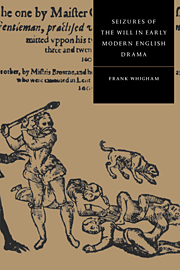Book contents
- Frontmatter
- Contents
- Acknowledgments
- Abbreviations
- Introduction
- 1 Forcing divorce in The Spanish Tragedy
- 2 Hunger and pain in Arden of Faversham
- 3 The ideology of prodigality in The Miseries of Enforced Marriage and A Yorkshire Tragedy
- 4 Sexual and social mobility in The Duchess of Malfi
- Afterword
- Notes
- Works cited
- Index
4 - Sexual and social mobility in The Duchess of Malfi
Published online by Cambridge University Press: 17 August 2009
- Frontmatter
- Contents
- Acknowledgments
- Abbreviations
- Introduction
- 1 Forcing divorce in The Spanish Tragedy
- 2 Hunger and pain in Arden of Faversham
- 3 The ideology of prodigality in The Miseries of Enforced Marriage and A Yorkshire Tragedy
- 4 Sexual and social mobility in The Duchess of Malfi
- Afterword
- Notes
- Works cited
- Index
Summary
The real subject is not primarily sexual lewdness at all, but “social lewdness” mythically expressed in sexual terms.
Burke A Rhetoric of MotivesIt may be compared to a cage, the birds without dispaire to get in, and those within dispaire to get out.
Florio's MontaigneThe Duchess of Malfi rewrites The Spanish Tragedy after Hamlet and King Lear. It echoes the early play's concerns with wandering royal women and hysterical royal men, with erotic mobility and killer servants. But it transforms these variables in crucial ways. The erotic mobility shifts distinctly, away from Bel-imperia's rebellious sexual raids and toward the emergent bourgeois and Protestant ideal of companionate marriage. Conversely, the tense fraternal defensiveness is even more embattled. Antonio's outrageous and successful invasion is far from heroic, his initial potency athletic rather than martial. Yet his achievement is, intolerably, fully marital. The Lorenzo figure attracts the lurid energy that his sister and her lover relinquish, and becomes himself uncontrollably eroticized. After Shakespeare's two greatest tragedies the figuration of status narcissism as incest has probably become inevitable. And Pedringano has come fully of age as well. The meditative qualities of the neglected malcontent have by 1614 been refracted among a host of pungent instances: Hamlet, Malevole, Iago, Vindice, Edmund, Kent, Webster's own Flamineo, all contribute to Bosola's strange mixture of calm knowing violence and puzzlement. The seminal issues of The Spanish Tragedy have now, after a full generation of Elizabethan and Jacobean drama, produced their curious bitter fruit.
- Type
- Chapter
- Information
- Seizures of the Will in Early Modern English Drama , pp. 188 - 224Publisher: Cambridge University PressPrint publication year: 1996
- 2
- Cited by



